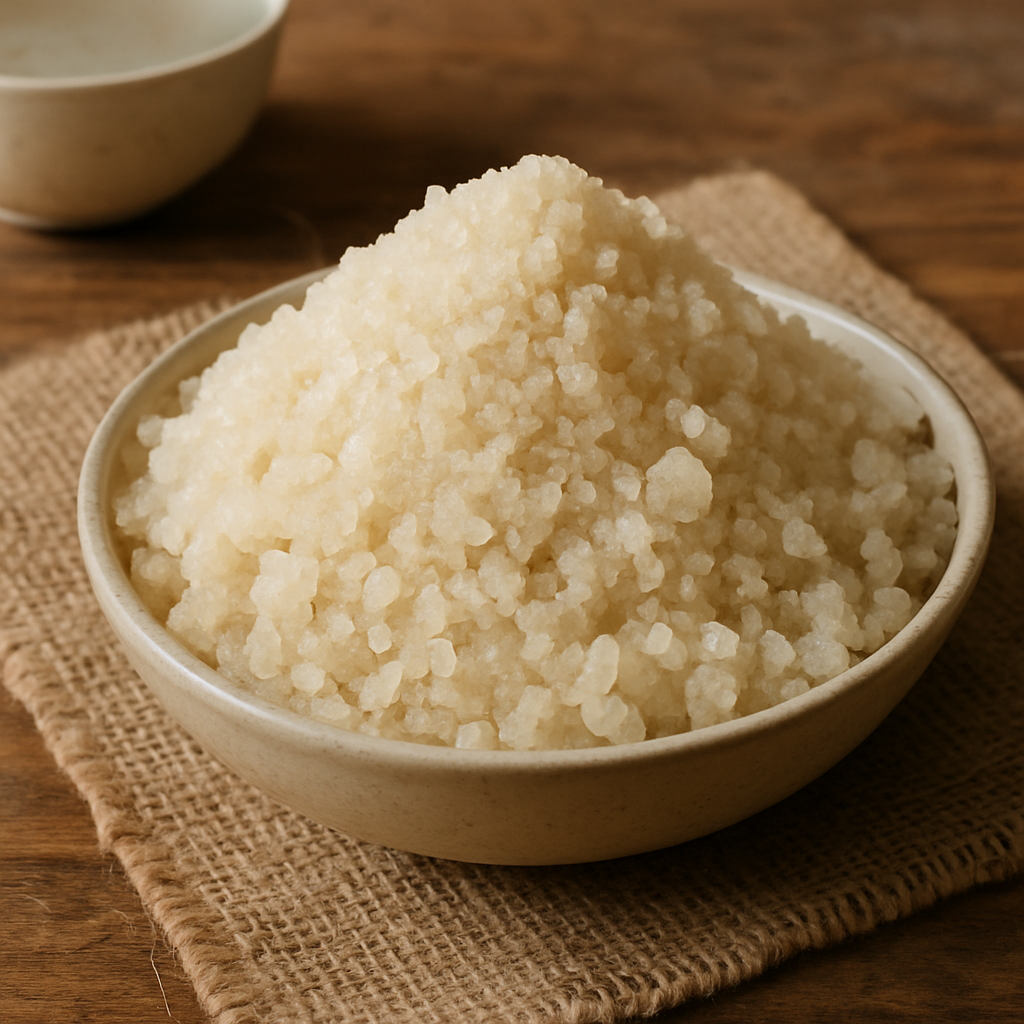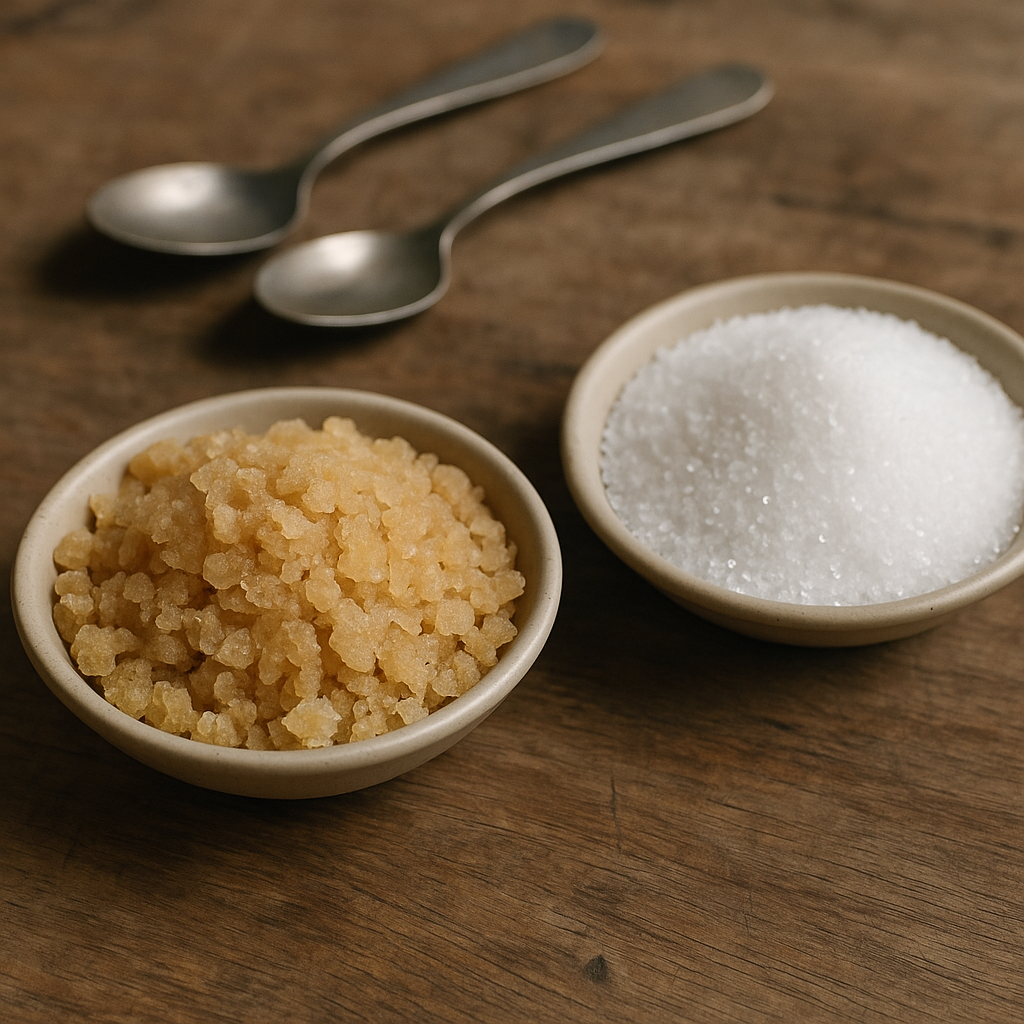Ask Ayurvedic doctor a question and get a consultation online on the problem of your concern in a free or paid mode. More than 2,000 experienced doctors work and wait for your questions on our site and help users to solve their health problems every day.
What Is Desi Khand? Meaning, Benefits, and Ayurvedic Uses

Desi khand is slowly making its way back into Indian kitchens—and even beyond. But what is desi khand really? Is it just another sweetener like brown sugar or jaggery, or is there more to the story? As modern diets get increasingly complicated, many people are seeking simple, traditional alternatives that not only taste good but also offer real health benefits. That’s where desi khand comes in.
In this article, we’ll explore what desi khand is, desi khand benefits, and how Ayurveda has been advocating its use for centuries. We’ll break down its origin, how it’s made, and why you might want to choose it over regular white sugar. Along the way, we'll also look at desi khand vs sugar, and how it stacks up against other natural sweeteners like brown sugar. Whether you're health-conscious, Ayurvedic curious, or just tired of ultra-processed foods, you're in for a sweet (pun intended!) treat.
Desi Khand Meaning and Origin in Ayurveda
Desi Khand Meaning and English Translation
Let’s start with the basics. Desi khand meaning in Hindi literally refers to traditional or indigenous unrefined sugar. The word “khand” has Sanskrit roots, and in English, desi khand in English is often translated as muscovado sugar or raw cane sugar, although neither is quite the same thing. These translations miss some of the cultural and nutritional nuance.
Desi khand means a natural, minimally processed sugar derived from sugarcane juice, using age-old techniques passed down in Indian villages. It’s not bleached, not refined, and contains no chemical additives. That right there makes it different from most of the stuff we find on grocery store shelves today.
Ayurveda, India’s ancient healing system, has long regarded desi khand as a sattvic food—meaning it's pure, balanced, and beneficial for both body and mind. According to Ayurvedic texts, it helps in balancing pitta and vata doshas, and provides a steady source of energy without the harsh spikes and crashes of refined sugar.
Organic Desi Khand vs Refined Sugar: How It's Made
Here’s the real deal—how organic desi khand is made can tell you a lot about why it's so highly regarded. Traditional desi khand is prepared by boiling sugarcane juice until it thickens into a viscous syrup. This is then allowed to cool and crystallize naturally. No bone char, no sulfur, no synthetic bleach. Just sun, time, and a whole lot of love (okay, maybe that’s a bit cheesy—but true!).
Refined white sugar, on the other hand, goes through a chemical-heavy process that strips away all molasses, minerals, and nutrients. What you're left with is pure sucrose and... not much else.
And yes, even brown sugar vs desi khand comparisons fall short, since brown sugar is often just refined sugar with molasses added back in—how weird is that?
Desi khand retains its natural color, texture, and taste because it doesn’t go through that harsh processing. That's part of why it’s often recommended in Ayurvedic cooking and traditional Indian sweets.

Desi Khand Benefits and Ayurvedic Value
Desi Khand Benefits for Digestion and Energy
Let’s be honest—we all want something sweet now and then. But wouldn't it be great if your sweetener actually helped your body instead of draining it? One of the standout desi khand benefits is how gentle it is on the digestive system.
According to Ayurveda, desi khand is easier to digest than refined sugar. It's known to support agni—that’s your digestive fire—and doesn’t lead to the bloating or acidity that some other sweeteners might cause. And it’s not just Ayurvedic texts that say this—people who've swapped out white sugar for desi khand in their chai or desserts often report fewer sugar crashes and more sustained energy.
Another benefit? Desi khand provides small but important amounts of minerals like calcium, iron, and magnesium. Now, it’s not a miracle superfood (let’s be real), but these trace minerals can add up over time and support your overall well-being. Especially for people with anemia or fatigue, the iron content—though modest—can be a nice boost.
Plus, since it doesn’t spike your blood sugar like refined alternatives, it’s a better option for those trying to manage energy levels throughout the day. Of course, moderation is key. Like, obviously.
Best Desi Khand for Daily Use and Sweet Cravings
If you’re thinking, “Okay, I’m sold. But how do I choose the best desi khand?” — good question.
Start with organic varieties. Organic desi khand is made without harmful pesticides or fertilizers, and usually comes from farms that respect traditional methods. Look for brands that don’t bleach or overly refine the product. It should have a natural beige or brownish color, and it might even feel slightly sticky—this is actually a good sign. That stickiness comes from residual molasses, which means it’s retained more nutrients.
Also, check the ingredient list. The best desi khand should have one ingredient: sugarcane juice (or dehydrated cane juice). If it’s got additives, preservatives, or “enhancers” — that’s a red flag.
Use it anywhere you’d use sugar. Stir it into your tea or coffee, sprinkle over porridge or yogurt, or use it in baking (though keep in mind, it may make things slightly denser or darker in color—but hey, that’s part of the charm).

Desi Khand vs Sugar: Which Is Healthier?
Brown Sugar vs Desi Khand: What’s the Real Difference?
Okay, let’s clear up the confusion around brown sugar vs desi khand. They might look kinda similar, but they are not the same thing.
Brown sugar is usually refined white sugar with molasses added back in. So it’s basically processed sugar doing dress-up. Desi khand, on the other hand, is raw from the beginning. It’s made without refining, which means it keeps more of the good stuff—like trace minerals and flavor.
Also, desi khand has a richer, more complex taste. While brown sugar is sweet and a bit flat, desi khand often has hints of caramel or earthy tones. It’s subtle, but really noticeable when you use it in cooking.
Why Ayurveda Recommends Desi Khand Over Processed Sugar
Ayurveda doesn’t just recommend any ol’ sweetener. It specifically praises desi khand for being sattvic and nourishing. Processed sugars are said to disturb the doshas, especially pitta, which governs metabolism and heat in the body.
Refined sugar is considered rajasic or even tamasic—it can agitate the mind, disrupt sleep, and dull the senses. Desi khand, on the other hand, is considered to promote clarity, calmness, and energy. It’s used in many Ayurvedic tonics and medicines, not just for flavor but for its energetic properties.
Alright, we’re almost at the end. Up next: the Conclusion and FAQs to wrap this all up with a neat lil’ bow 🎁
Conclusion
So, what have we learned here? Well, a lot actually. First, what is desi khand? It's not just some trendy “natural sugar”—it’s a traditional, time-tested sweetener with deep roots in Indian culture and Ayurveda. The desi khand meaning goes beyond its simple definition; it carries a legacy of health, purity, and sustainable living.
Compared to refined sugar, desi khand benefits are clear: it’s easier to digest, less processed, and may even support energy and mineral intake when used moderately. It’s also more aligned with Ayurvedic principles, which consider food as not just fuel, but medicine.
When we look at desi khand vs sugar, or even brown sugar vs desi khand, the difference is night and day. You’re not just making a slightly better choice—you’re making a completely different one, with fewer additives, fewer chemicals, and more of the good stuff your body can actually use.
Choosing the best desi khand means opting for products that are organic, traditionally made, and as unrefined as possible. You don’t need to overhaul your entire diet overnight. Just start with the small stuff: your morning chai, that occasional dessert, maybe a spoon in your smoothie.
It’s a sweet shift—but one that could have real, lasting impact on your health.
Try it for a week. Just a week. You might be surprised at how your body responds.
And hey, if you found this helpful—share it with a friend, or your mom, or that person in your office who’s always adding sugar to their “healthy” tea. You know the one ;)
FAQs
Is jaggery and khand the same?
Nope. While both come from sugarcane and are unrefined, jaggery is more sticky and gooey—it's boiled further and solidified into blocks. Desi khand is crystal-like, more like sugar, and has a slightly milder taste. They’re close cousins, not twins.
How to identify original desi khand?
Look for a light brown to beige color, slightly coarse texture, and natural scent. If it's too white or smells odd, it’s probably been refined or mixed. Also, real organic desi khand usually comes in non-glossy packaging and may even clump a bit due to moisture.
Does desi khand have any side effects with overuse?
Yep, just like any sugar—even the natural ones. Overconsumption can lead to weight gain, blood sugar issues, and fatigue. It’s better than refined sugar, but still sugar. Use it smartly. Everything in balance, right?
Final thoughts? Ditching processed sugar doesn't mean ditching sweetness. It means choosing better, tastier, and maybe even more ethical alternatives. Desi khand offers all of that—and a taste of tradition too.
If you're ready to make the switch, check out some best desi khand brands online or at your local organic store. Trust us, your body (and your chai) will thank you.

